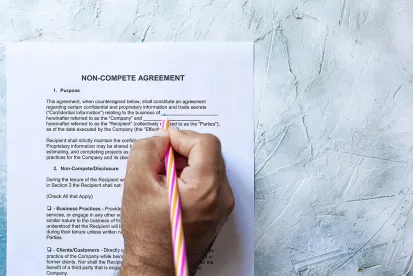Can you still have noncompete agreements with your employees? What if you explicitly state that the agreement protects trade secrets or other proprietary information? There has been a lot of buzz about this issue, and recently the general counsel of the National Labor Relations Board joined the conversation with a memorandum, GC 23-08, opining that noncompete and non-solicitation agreements violate the National Labor Relations Act. This continues a recent trend of government activity focused on noncompete and non-solicitation agreements. For more information on prior actions by the Federal Trade Commission (FTC) and other entities, please see Bradley’s prior coverage here.
This guidance is not a surprise. The NLRB’s General Counsel Jennifer Abruzzo previewed this position back in March, when she published GC 23-05 seeking to clarify the board’s decision in McLaren Macomb, which held that overly broad confidentiality and non-disparagement provisions violate the NLRA. At the end of GC 23-05, she noted that “non-compete clauses; no solicitation clauses; no poaching clauses” and other provisions in separation agreements interfere with employees’ exercise of rights provided under Section 7 of the NLRA. (This and other general counsel memorandums can be found here.) It is an unfair labor practice, in violation of Section 8 of the NLRA, “to interfere with, restrain, or coerce employees in the exercise of the rights” guaranteed in Section 7.
Is the Protection of Trade Secrets a “Legitimate Interest[]” That May Support Restrictive Covenant Obligations?
According to the general counsel, the (1) offer, (2) maintenance, and/or (3) enforcement of restrictive covenant obligations each constitute an unlawful labor practice under the NLRA unless they are “narrowly tailored to special circumstances justifying the infringement on employee rights.”
While state laws certainly differ, many states permit individuals and entities in employment and other relationships to enter into mutually beneficial restrictive covenant agreements. These agreements can support a host of legitimate business interests. For example, a Georgia statute identifies various legitimate business interests, including, but expressly not limited to, (1) the protection of trade secrets; (2) the protection of valuable confidential information; (3) relationships with specific prospective or existing customers, patients, vendors, or clients; (4) customer, patient, or client good will associated with ongoing business practices, trade names, trademarks, service marks, or trade dress, specific geographic locations, specific marketing or trade areas; or (5) specialized training. The Alabama Code has a similar list of protectable interests.
The general counsel’s memorandum challenges what legitimate business interests might constitute sufficient “special circumstances” to justify post-employment restrictions. According to the general counsel, the mere desire to avoid competition is not a legitimate business interest, nor are “interests in retaining employees or protecting special investments in training employees” if there are less restrictive means to protect such interests. The general counsel seems to acknowledge that “protecting proprietary or trade secret information” is a legitimate business interest associated with restrictive covenant agreements but argues that they can be protected with certain unspecified “narrowly tailored workplace agreements that protect those interests.” Finally, the general counsel argues that an employer would be “unlikely” to establish a sufficient business interest if the provisions are imposed on “low-wage or middle-wage workers who lack access to trade secrets or other protectible interests, or in states where non-compete provisions are unenforceable.” The latter reference could be an indication that the NLRB might take the position that a provision that is made enforceable only through “blue penciling” a restrictive covenant agreement violates the NLRA.
Some states also require, and some businesses voluntarily offer, additional compensation or other consideration (including equity interests) in connection with entering into restrictive covenant agreements. The general counsel’s memorandum does not address this issue. Also, supervisors and owners are not protected by the NLRA, so restrictive covenant agreements with management employees and owners may be unaffected by this guidance. But be careful: The general counsel’s recent memorandum regarding McLaren Macomb (23-05) suggests that there may be retaliation circumstances where a supervisor would be protected. Accordingly, the NLRB might investigate or challenge restrictions in separation agreements or agreements executed after an individual is hired, even with supervisors.
Interagency Cooperation and Potential Damages Even Without Employer Enforcement
The memorandum recommends that investigators submit to the NLRB’s Division of Advice on any agreements “that are arguably unlawful under the analysis summarized herein” and seek make-whole relief for employees who miss out on employment opportunities “even absent additional conduct by the employer to enforce the provision.” So, even if you don’t seek to enforce the restrictive covenant, the NLRB may pursue this issue. The memorandum advises investigators to “seek evidence of the impact” of certain restrictions on employees to determine whether certain relief should be offered.
The general counsel also reiterated her commitment to interagency collaboration on workplace mobility issues, citing the memorandum of understanding that the NLRB entered into last year with the FTC and the Department of Justice’s Antitrust Division.
Review Agreements and Seek Assistance from Counsel
While employers that are already the subject of unfair labor practice investigations should have a heightened sensitivity to this new guidance, the NLRB and its active cooperation with other federal agencies means that all employers should be on guard. Whether you have a union in place or not, the NLRB applies to you, and you should assess the potential impact of this recent investigative focus. Bradley attorneys in the Labor and Employment and Intellectual Property practice groups are available to assist with any questions or concerns that you may have.





 />i
/>i
